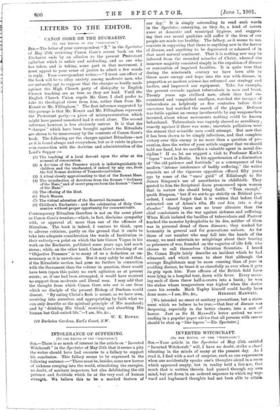• LETTERS TO THE EDITOR.
CANON GORE ON THE EUCHARIST.
[To THE EDITOR OF TILE "SPECTATOR."] Stn,—The letter of your correspondent " X " in the Spectator of May 25th reviewing Canon Gore's recent book on the
Eucharist ends by an allusion to the present Protestant agitation which is unfair and misleading, and as one who has taken, and _ is taking, some part in that movement, I must, appeal to your sense of justice to admit a few words in reply. Your correspondent writes :—" I trust one effect of the book will be to allay anxiety among moderate men, who are naturally apt to suppose that the charges so loudly made against the High Church party of disloyalty to English Church teaching are as true as they are loud. Until the English Church Union expels Mr. Gore, I shall prefer to take its theological views from him, rather than from Mr.
Kensit or Mr. Fillingbam." The first inference suggested by this pagsage is that Mr. Kensit and Mr. Fillingbam represent the Protestant party,—a piece of misrepresentation which might have passed unnoticed had it stood alone. The second inference, however, is less obviously untrue. It is that the "charges" which have been brought against the Ritualists are shown to be unnecessary by the contents of Canon Gore's book. The following are the charges against Ritualism—not . as it is found always and everywhere, but as it exists in places —in connection with the doctrine and administration of the Lord's Supper :—
(1) The teaching of a local descent upon the altar at the moment of consecration.
• (2) A doctrine of the Presence which is indistinguishable by children and the uneducated, if indeed by any one, from • the full Roman doctrine of Transubstantiation.
(3) A ritual closely approximating to that of the Roman Mass. - (4) The introduction of devotions from the Roman "Ordinary of the Mass," and of secret prayers from the Roman" Canon of the Mass."
(5) The offering of the Host.
(6) Black Masses.
(7) The virtual adoration of the Reserved Sacrament.
(8) Children's Encharists : and the celebration of Holy Com- munion without proper opportunity for communicants.
Contemporary Ritualism therefore is not on the same plane as Canon Gore's treatise,—which, in fact, disclaims sympathy with, or approval of, more than one of the offences of Ritualism. The book is indeed, I venture to think, open
to adverse criticism, partly on the ground that it omits to take into adequate consideration the words of Institution in their entirely,--a point on which thelate Canon Vogan in his
work on the Eucharist, published some years ago, laid much stress; while, on the other hand, Canon Gore's teaching of an "Objective Presence" is to many of us a deduction as un- necessary as it is unwelcome. But it. may safely be said that,
4 if the Ritualistic section had gone no further in connection With the Sacrament than the volume in question, there would have been (upon this point) no such agitation as at present exists; or, if one had been attempted, it would have received no support from moderate and liberal men. I may add that the thought from which Canon Gore sets out is one from which no disciple of the present Bishop of Durham would dissent. "By eating Christ's flesh is meant, as we have seen, receiving into ourselves and appropriating by faith what we can only describe as the spiritual principle of His manhood; and by 'drinking His blood,' receiving and absorbing His human but God-united life."—I am, Sir, Sze.,
W. E. BOWEN.
119 Barkston Gardens, Earl's Court, S. W.






































 Previous page
Previous page